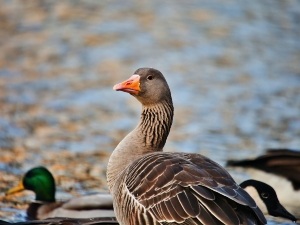
Ducks may be sweet adorable animals but these animals are wild animals at their core and can thus be very dangerous if provoked, and provoked ducks can bite you.
If a duck bites you you may be wondering if duck bites are dangerous, this artcle looks into it
Table of Contents
Is A Duck Bite Dangerous?
It is often recommended that we wash our hands after we touch a duck or any other animal, this is because these animals can carry a variety of bacteria and diseases. Here are reasons why duck bites can be dangerous:
Injuries:
Ducks are usually very mild-mannered but some ducks can become aggressive and bite, and these bites are no joke. Both male and female ducks will bite you, drakes more often than female ducks but both bite all the same.
These birds may bite your hand if they mistake your hand for food or if they feel threatened by you.
A duck’s bill may not have teeth but they do have what is called lamellae. These are thin comb-like structures in the bird’s mouth that look like serrated teeth or hooks.
A duck bite will be painful if enough force is applied and if the hooks get into your skin. The bites can result in some bruising and the hooks can puncture your skin in some cases.
The lamellae are pliable but if enough force is applied they can get into your skin and they will hurt if your hand gets caught in the bill and you try to pull it off
If the lamellae don’t puncture your skin you can still get bruising and swelling from the force of being bitten by a duck depending on how hard the duck bites you.
In some cases, the bite will break blood vessels under your skin, which is what will cause bruising on your skin
Sicknesses:
Ducks may seem clean but touching them can result in cramps, fever, and diarrhea if you get salmonella after interacting with these birds.
A lot of people suffer from salmonella and suffer in silence, if people do contract this illness they may not mention to their doctors that embracing their ducks caused this ailment to develop
The cleanest of birds can be sick with salmonella, many birds don’t show obvious symptoms of salmonella and the cleanest of birds can be quite dirty.
If a duck bites you the germs in their mouth can get onto your hands or fingers depending on where they bite. If you touch your mouth without washing your hands then the bacteria can get into your mouth and make you sick
What to do if you’re bitten by a duck:
A duck bite can in some cases puncture your skin but this doesn’t happen often.
What does happen often is bacteria being transferred onto your skin and hands when the bird bites you or when you handle the bird. This is why washing your hands after a duck bite or even a duck interaction is important.
Wash your hand thoroughly after interacting with the bird or use hand sanitizer on your hands if you can’t get to soap and water any time soon.
If you are a person with a weakened immune system then you should be extra cautious.
Keep these birds away from anyone who is over 65 and anyone under the age of 5 years old as salmonella can affect these types of people worse than those with healthy robust immune systems.
If the bite did not puncture your skin then you may only need a pain reliever to feel better, reduce the pain and reduce the swelling
If the duck’s lamellae do hook into your skin you’d need to be very careful when removing the duck’s bill.
You wouldn’t want the hooks to tear your skin too much so try to remove the bird’s bill slowly and gently to keep your hand from becoming too damaged.
If there is an open puncture on your skin from the lamellae then start off by cleaning the area with an antiseptic to keep bacteria and an infection at bay. After this, go ahead and wrap the wound to help it heal and keep bacteria at bay
If the bleeding doesn’t stop on its own then you’d need professional medical attention.
If you enjoyed this article then you may also be interested in other duck related articles. Here are some articles that you may be interested in: How Do Ducks Feed Their Babies?, Why Do Ducks Follow Cows?, Why Do Ducks Eat Their Own Poop, Duck Laid One Egg And Left, Why Do Geese Fight Each Other?,

